I am writing MATLAB code with the intention to do some fittings. I simulated a plot using a second-order Gaussian (see my code below) and tried fitting using the lsqcurvefit function. Unfortunately, MATLAB returns the same guess values as 'optimized' parameters and apparently gets stuck in a local minimum.
Can someone please provide some advice as to what might be wrong here? I know that if the guess is far from the 'true' values then this can happen, but I expected MATLAB to return an answer which was closer to true value. Improving the initial guess to [29,0] (which is much closer to the actual value) results in the same output: that the initial value is a local minimum.
%%%%%%%%%%
function z= testfunction(x, xdata);
sigma=x(1)/(2*sqrt(2*log(2)));
z=((xdata.^2-2*x(2)*xdata-sigma.^2+x(2)^2)./(sigma^5*sqrt(2*pi))).*exp(-(xdata-x(2)).^2/(2.*sigma.^2));
end
%%%%%%%%
% Simulate Data
xdata= -50:1:50;
ydata = testfunction([30,0],xdata);
% Fit Data
xfit = lsqcurvefit(@testfunction,[19,-4],xdata, ydata );
xfit(1)
xfit(2)
yfit=testfunction([xfit(1),xfit(2)],xdata);
% Plot Data;
plot(xdata,yfit);
hold on;
plot(xdata,ydata,'o')
Output:
Initial point is a local minimum.
Optimization completed because the size of the gradient at the initial point
is less than the default value of the optimality tolerance.
<stopping criteria details>
ans =
19
ans =
-4


